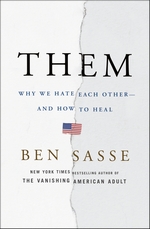 Them: Why We Hate Each Other – and How to Hea
Them: Why We Hate Each Other – and How to Hea
by Ben Sasse
Hardcover, 288 pg.
St. Martin’s Press, 2018
Read: November 27 – 30, 2018

I really do prefer to come up with my own synopsis/summary, but I was struggling to come up with one without this taking 3-4 times as much space as I usually do for an entire post. So, I’ll just use the Publisher’s:
| Something is wrong. We all know it.
American life expectancy is declining for a third straight year. Birth rates are dropping. Nearly half of us think the other political party isn’t just wrong; they’re evil. We’re the richest country in history, but we’ve never been more pessimistic. What’s causing the despair? In Them, bestselling author and U.S. senator Ben Sasse argues that, contrary to conventional wisdom, our crisis isn’t really about politics. It’s that we’re so lonely we can’t see straight—and it bubbles out as anger. Local communities are collapsing. Across the nation, little leagues are disappearing, Rotary clubs are dwindling, and in all likelihood, we don’t know the neighbor two doors down. Work isn’t what we’d hoped: less certainty, few lifelong coworkers, shallow purpose. Stable families and enduring friendships—life’s fundamental pillars—are in statistical freefall. As traditional tribes of place evaporate, we rally against common enemies so we can feel part of a team. No institutions command widespread public trust, enabling foreign intelligence agencies to use technology to pick the scabs on our toxic divisions. We’re in danger of half of us believing different facts than the other half, and the digital revolution throws gas on the fire. There’s a path forward—but reversing our decline requires something radical: a rediscovery of real places and human-to-human relationships. Even as technology nudges us to become rootless, Sasse shows how only a recovery of rootedness can heal our lonely souls. America wants you to be happy, but more urgently, America needs you to love your neighbor and connect with your community. Fixing what’s wrong with the country depends on it. |
Now, a lot of people are talking about/writing about negative tweets, hostility between parties, loss of civility, etc. in our contemporary culture. But most of them are discussing symptoms of something deeper — and addressing the symptoms isn’t going to help much. Sasse wants to focus on the underlying issues and spends a lot of time talking about them before describing how he best thinks we can take care of them (and the symptoms).
I am not entirely convinced that he’s diagnosing the problems correctly — but he’s as close as I’ve seen. In short, we’ve stopped seeing our fellow Americans as countrymen that need to be convinced and compromised with, instead as evil opponents that need to be defeated and humiliated. It doesn’t matter if we’re talking politics, social policy, or people who like a TV show you don’t. The loss of civility, decency and humility in our culture is a clear and present danger to our union.
I’ve got a strong, strong desire to spend a week or two posting about this book — going through it a chapter at a time. But this isn’t that kind of blog — and I just don’t have that kind of time. There are places for that sort of conversation, this isn’t one of them. The books thought-provoking, inspiring, discouraging, and entertaining — not usually at the same time, but frequently within a couple of pages. I took pages of notes — really. Some of them just because I liked his phrasing. Some because I wanted to spend some time thinking about what he said, or doing follow-up reading, Some because I thought he nailed the idea.
Now, while Sasse goes to great pains to keep the book a-political (at least when it comes to specific policies), he correctly sees that politics is one of the main ways we’re separating ourselves from one another — or are being separated by them. So he talks about some of the ways that’s happening, and because he’s more familiar with the antics of the Right, he focuses primarily on them (also, it’ll give him more credibility to beat up his “own” team than the other guys). There are some Republicans that he cites favorably, and some Democrats that he puts in negative light — but primarily, Democrats come out of his book looking a lot better than his fellow Republicans do. I liked that a lot. If nothing else, it shows that Sasse’s willing to practice a lot of what he preaches (maybe all of it, I don’t know).
Sasse writes with conviction and compassion, humor and wisdom, even if (maybe especially if) you disagree with his politics, he’ll win you over with his common-sense realism. Some of his proposed solutions seem very pie-in-the-sky, and those are my favorites. Some of them seem more likely to succeed, but either way, just people talking and thinking about them is a step in the right direction. And I can’t help but imagine just that would be enough to satisfy Sasse. Read this book. Get others to read it. Talk about it.
—–




Ola G
There was a book by Robert D. Putnam from 2000, called Bowling Alone: The Collapse and Revival of American Community, which was developed from a 1995 essay… He wrote about the same symptoms and he was criticised by repeating findings from 1920s (Middletown studies) – but I think he was right: the decline in participation in all type of personal relations in the U.S is quite worrying, especially because it leads to deep social divisions. Great review!